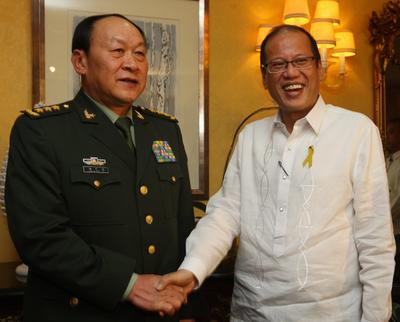In the wake of Chinese naval and diplomatic assertiveness in the South China Sea during 2010, a number of states in the region have begun developing closer diplomatic and security links to the United States and with other powers in the region.
On 17 June, Vietnamese and American officials met in Washington for a political, security and defence dialogue, where the two pledged to work towards a ‘strategic partnership’, and affirmed the need to protect the freedom of the seas. In the same week, the Philippines garnered ASEAN diplomatic support for ‘a peaceful resolution’ of maritime disputes according to the UN Convention on the Law of the Seas, while also seeking US defence guarantees as outlined in the 1951 US-Philippines Mutual Defence Treaty. In a meeting with US Secretary of State Hillary Clinton, Philippines Foreign Minister Albert del Rosario gained assurances that the US would defend the Philippines in any conflict with China over disputed islands. Indonesia, the region’s second largest power — and one without direct claims — has intervened diplomatically, contesting Chinese claims in a letter (covered in the Economist) to a UN Commission this summer.
And the South China Sea is not the only place where states are banding together diplomatically against China. This year has seen a remarkable phenomenon in Northeast Asia. South Korea has drifted towards a trilateral security relationship with the US and Japan. In a Trilateral Statement made this December, the three countries pledged to build ‘strong, productive, and constructive relations with China’, while also ‘maintaining peace, prosperity, and stability in the region … and promoting and protecting freedom, democracy, and human rights worldwide’. Long-considered by US alliance managers in the region, the possibility of a Trilateral ROK-US-Japan Alliance coming into shape is almost entirely Beijing’s doing. China’s unwavering support for Pyongyang over the Choenan sinking and Yeonpyeong artillery incident destroyed years of accumulated Chinese diplomatic capital in Seoul. Furthermore, the inability of Beijing to control nationalist elements in the PLA Navy pushed Tokyo away from the pan-Asian aspirations of Prime Minister Hatoyama.
While Chinese analysts are more than willing to use these developments as proof that the United States has somehow connived to contain China, the simple truth is Washington couldn’t have achieved this without Beijing’s help. What exactly has happened to the once-vaunted notion of soft power with Chinese characteristics? If this reappraisal of Chinese diplomacy is due to US efforts, it would stand as one of the most successful diplomatic campaigns in history. But it’s not quite true. In reality, China has lost a measure of control over the execution of its foreign policy to the PLA, to the Ministry of Fisheries, and to erratic individuals like helicopter pilots and fishing boat captains. China has, by its own admission, jettisoned the ‘peaceful rise’ of Deng Xiaoping but has not decided on a clear replacement. In the absence of a clearly defined policy, Beijing is being impelled by internal forces along a bellicose path previously marked by every rising authoritarian regime in history. Up until 2008, Chinese planners seemed smarter than that, and seemed determined to avoid the mistakes of history.
The year 2012, with its leadership changes across Asia, and the continued rise of tensions over maritime border disputes, will be critical. As one of the greatest success stories in human history, one hopes that China will realise how critical this year is and change course before it’s too late.
John Hemmings is a co-ordinator and research analyst for the International Security Studies Department at the Royal United Services Institute and a non-resident SPF Fellow at the Pacific Forum, Center for Strategic and International Studies.

